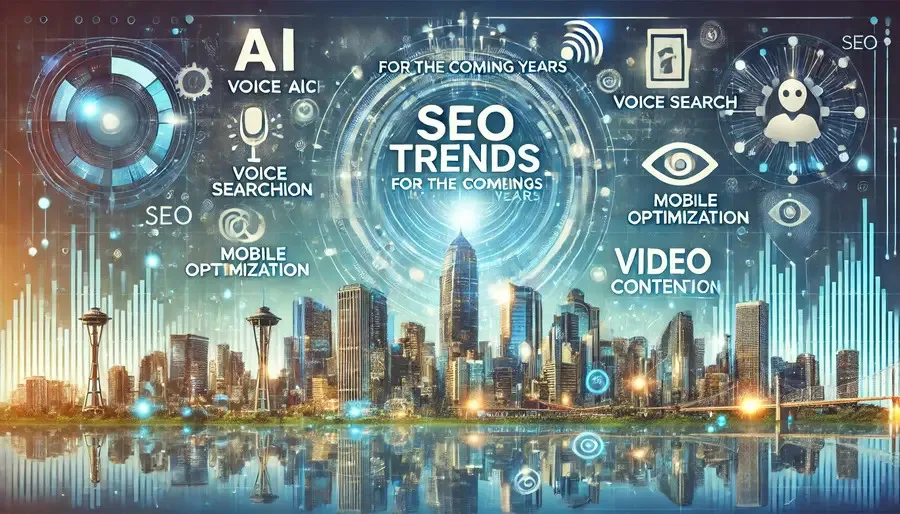
The Future of SEO: Trends and Predictions for the Coming Years
Search Engine Optimization (SEO) has become a crucial aspect of digital marketing, essential for driving traffic and increasing visibility online. Understanding the evolving landscape of SEO is vital for businesses to stay competitive and relevant.
As search engines continuously update their algorithms, staying informed about the latest SEO trends ensures that your website remains optimized and ranks well. This proactive approach helps avoid penalties and maximizes the effectiveness of your digital marketing strategy.
Artificial Intelligence and Machine Learning in SEO
The integration of AI and machine learning in search algorithms, such as Google’s RankBrain, has significantly changed how search engines interpret queries and rank websites. These technologies analyze user behavior to provide more relevant results, making it crucial for content to align with user intent.
To optimize for AI, focus on creating high-quality, user-centric content. Utilize natural language processing (NLP) techniques to ensure your content is easily understood by AI. Implementing structured data can also help search engines better comprehend your content.
The Importance of User Experience (UX)
Page load speed is a critical factor for user experience and SEO. Slow-loading pages can lead to higher bounce rates and lower rankings. Utilize tools like Google PageSpeed Insights to identify and fix performance issues, ensuring a faster and smoother user experience.
With the increasing use of mobile devices, mobile optimization has become essential. Ensure your website is responsive, offers easy navigation, and loads quickly on mobile devices to meet the expectations of mobile users and comply with Google’s mobile-first indexing.
Voice Search and Its Impact on SEO
The popularity of voice assistants like Siri, Alexa, and Google Assistant is reshaping search behavior. Voice searches tend to be more conversational and question-based, necessitating a shift in SEO strategies to include natural language queries and long-tail keywords.
To optimize for voice search, create content that answers common questions directly and concisely. Use structured data to help search engines understand the context of your content and improve its chances of being featured in voice search results.

The Role of Video Content in SEO
Video content is becoming increasingly important in digital marketing strategies. Videos can engage users more effectively than text and can significantly boost SEO by increasing dwell time and providing rich content for search engines to index.
To optimize videos for SEO, ensure they are properly tagged with relevant keywords and descriptions. Utilize transcripts to provide additional text for search engines to index. Embedding videos on your website can also enhance user engagement and improve your site’s overall SEO performance.
Local SEO
Local SEO has gained importance as more users perform searches with local intent. Optimizing for local search involves claiming and optimizing your Google My Business listing, using local keywords, and encouraging customer reviews.
Google My Business is a powerful tool for local SEO. Ensure your listing is complete and accurate, including your business name, address, phone number, and operating hours. Encourage satisfied customers to leave positive reviews to boost your local ranking.
Site Security and HTTPS
Website security is a ranking factor in Google’s algorithm. Ensuring your site uses HTTPS can improve your rankings and provide a secure browsing experience for users. This enhances trust and can lead to higher conversion rates.
Staying updated with Google’s security policies is essential. Implementing security best practices, such as regular updates, using strong passwords, and monitoring for vulnerabilities, helps protect your site from threats and maintains its SEO health.
Automation of SEO Processes
Automation tools can streamline various SEO tasks, from keyword research to backlink analysis. Using tools like SEMrush, Ahrefs, and Moz can save time and provide valuable insights to enhance your SEO strategy.
While automation can improve efficiency, maintaining quality is crucial. Ensure that automated processes are supplemented with human oversight to preserve the quality and relevance of your content.
Increasing Role of Data and Analytics
Data and analytics play a crucial role in understanding and improving SEO performance. Key metrics include organic traffic, bounce rate, conversion rate, and keyword rankings. Regularly analyzing these metrics helps identify areas for improvement.
Integrating data from various sources, such as Google Analytics and Search Console, can provide a comprehensive view of your SEO performance. This holistic approach enables better decision-making and more effective strategy adjustments.
